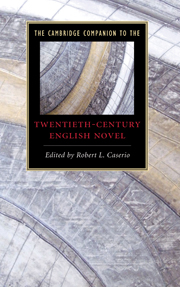Book contents
- Frontmatter
- Introduction
- 1 The art of English fiction in the twentieth century
- 2 The British Empire and the English modernist novel
- 3 Realism and rebellion in Edwardian and Georgian fiction
- 4 The Great War in English fiction
- 5 Postwar modernism in the 1920s and 1930s: The mammoth in the basement
- 6 Regionalism in English fiction between the wars
- 7 Ireland and English fiction
- 8 Feminist fiction
- 9 Working-class fiction across the century
- 10 World War II, the welfare state, and postwar “humanism”
- 11 The Windrush generation
- 12 History in fiction
- 13 Postmodernisms of English fiction
- 14 Detectives and spies
- 15 The post-consensus novel: Minority culture, multiculturalism, and transnational comparison
- 16 An absurd century: Varieties of satire
- 17 The other side of history: Fantasy, romance, horror, and science fiction
- Further reading
- Index
2 - The British Empire and the English modernist novel
Published online by Cambridge University Press: 28 July 2009
- Frontmatter
- Introduction
- 1 The art of English fiction in the twentieth century
- 2 The British Empire and the English modernist novel
- 3 Realism and rebellion in Edwardian and Georgian fiction
- 4 The Great War in English fiction
- 5 Postwar modernism in the 1920s and 1930s: The mammoth in the basement
- 6 Regionalism in English fiction between the wars
- 7 Ireland and English fiction
- 8 Feminist fiction
- 9 Working-class fiction across the century
- 10 World War II, the welfare state, and postwar “humanism”
- 11 The Windrush generation
- 12 History in fiction
- 13 Postmodernisms of English fiction
- 14 Detectives and spies
- 15 The post-consensus novel: Minority culture, multiculturalism, and transnational comparison
- 16 An absurd century: Varieties of satire
- 17 The other side of history: Fantasy, romance, horror, and science fiction
- Further reading
- Index
Summary
Many modernist innovators of English fiction during the first half of the twentieth century had personal experience of European colonialism and a significant artistic interest in it. Does their encounter with colonialism, as historical cause, biographical incitement, or literary subject matter, contribute to modernist fiction's unsettling of Victorian values and realist idioms? Does the experimental character of modernist fiction reach its revisionary potential as it assimilates colonial plots and settings, nonwestern cultural objects, and symbols harvested from anthropological research or primitivist myth?
There are two ways to answer these questions. The first way sees in literary modernism an implicit opposition to imperialism. Benita Parry argues that modernist style disrupts the “moral confidence” of western imperialism; Edward Said suggests that modernism's “pervasive irony” undermines the triumphalism of imperialism's agents, the European bourgeoisie. The alternative answer argues that modernism's aesthetic hallmarks, including what Elleke Boehmer calls “multivoicedness,” can be understood as stylistic correlates to imperialism. Raymond Williams's concept of “metropolitan perception,” representing a key formulation of this second premise, assigns characteristic forms of modernist thought and expression to the cultural privilege of artists working in western imperial centers.
- Type
- Chapter
- Information
- Publisher: Cambridge University PressPrint publication year: 2009



